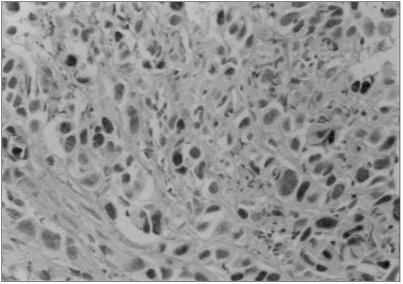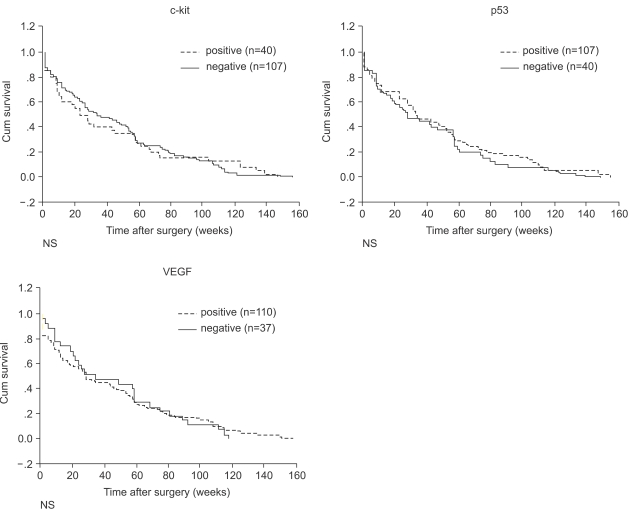Cancer Res Treat.
2004 Jun;36(3):167-172.
Expression of c-kit and p53 in Non-small Cell Lung Cancers
- Affiliations
-
- 1Department of Pathology, St. Vincent's Hospital, The Catholic University of Korea, Suwon, Korea.
- 2Department of Internal Medicine, St. Vincent's Hospital, The Catholic University of Korea, Suwon, Korea. kimhoonkyo@yahoo.co.kr
- 3Department of Diagnostic Radiology, St. Vincent's Hospital, The Catholic University of Korea, Suwon, Korea.
- 4Department of Radiation Oncology, St. Vincent's Hospital, The Catholic University of Korea, Suwon, Korea.
- 5Department of Thoracic Surgery, St. Vincent's Hospital, The Catholic University of Korea, Suwon, Korea.
Abstract
- PURPOSE
Increasing experimental evidence indicates that abnormal expression of c-kit may be implicated in the pathogenesis of a variety of solid tumors. It has been reported that over 70% of small cell lung cancer (SCLC) contain the c-kit receptor. In the present study, a c-kit analysis has been extended to non-small cell lung cancer (NSCLC). The expressions of p53, vascular endothelial growth factor (VEGF) and cd34, in addition to c-kit, were evaluated to investigate the correlations between these proteins and to determine their potential relationships with the clinicopathological data. MATERIALS AND METHODS: Paraffin-embedded tumor sections, obtained from 147 patients with NSCLC, were immunohistochemically investigated using anti-c-kit, anti- p53, anti-VEGF and anti-cd34 antibodies. RESULTS: c-kit was expressed in 40 (27%) of the tumors examined: 27% of the adenocarcinomas, 27% of the squamous cell carcinomas and 29% of the undifferentiated carcinomas. p53 and VEG F immunoreactivities were present in 107 (73%) and 110 (75%) carcinomas, respectively. Anti-cd34 was negative in all samples. No associations were established among these proteins. The c-kit, however, showed a strong correlation with the T factor: T1 (n=11), 0%; T2 (n=49), 16% and T3 (n=87), 37% (p=.006). CONCLUSION: It is suggested that in NSCLC c-kit is expressed relatively frequently and may become a therapeutic target for the patients with inoperable or recurrent c-kit positive tumors. The alterations in p53 probably constitute an early event, whereas the activated c-kit may contribute to tumor progression.
Keyword
MeSH Terms
Figure
Reference
-
1. Majumder S, Brown K, Qiu FH, Besmer P. c-kit protein, a transmembrane kinase: Identification in tissues and characterization. Mol Cell Biol. 1988; 8:4896–4903. PMID: 2463468.
Article2. Ashman LK. The biology of stem-cell factor and its receptor c-kit. Int J Biochem Cell Biol. 1999; 31:1037–1051. PMID: 10582338.3. Pietsch T, Kyas U, Steffens U, Ukisan E, Hadam MR, Ludwig WD, Zsebo K, Welte K. Effects of human stem-cell factor (c-kit ligand) on proliferation of myeloid leukemia cells: heterogeneity in response and synergy with other hematopoietic growth factors. Blood. 1992; 80:1199–1206. PMID: 1381238.4. Heinrich MC, Rubin BP, Longley BJ, Fletcher JA. Biology and genetic aspects of gastrointestinal stromal tumors: KIT activation and cytogenetic alterations. Hum Pathol. 2002; 33:484–495. PMID: 12094373.
Article5. Lassam N, Bickford S. Loss of c-kit expression in cultured melanoma cells. Oncogene. 1992; 7:51–56. PMID: 1371338.6. Strohmeyer T, Peter S, Hartmann M, Munemitsu S, Ackermann R, Ullrich A, Slamon DJ. Expression of the hst-1 and c-kit protooncogenes in human testicular germ cell tumors. Cancer Res. 1991; 51:1811–1816. PMID: 1706218.7. Hines SJ, Organ C, Kornstein MJ, Krystal GW. Coexpression of the c-kit and stem cell factor genes in breast carcinomas. Cell Growth Differ. 1995; 6:769–779. PMID: 7545433.8. Hibi K, Takahashi T, Nakamura S, Sekido Y, Ueda R, Hida T, Ariyoshi Y, Takagi H, Takahashi T. Coexpression of the stem cell factor and the c-kit genes in small-cell lung cancer. Oncogene. 1991; 6:2291–2296. PMID: 1722571.9. Plummer H, Catlett J, Leftwich J, Armstrong B, Carlson P, Huff T, Krystal G. c-myc expression correlates with suppression of c-kit proto-oncogene expression in small cell lung cancer cell lines. Cancer Res. 1993; 53:4337–4342. PMID: 7689933.10. Krystal GW, Honsawek S, Kiewlich D, Liang C, Vasile S, Sun L, McMahon G, Lipson KE. Indolinone tyrosine kinase inhibitors block kit activation and growth of small cell lung cancer cells. Cancer Res. 2001; 61:3660–3668. PMID: 11325836.11. Travis WD, Colby TV, Corrin B, Shimosato Y, Brambilla E. Travis W.D., editorHistological typing of lung and pleural tumors. World Health Organization International Histological Classification of Tumors. Histological Typing of Lung and Pleural Tumors. 1999. 3rd ed. Berlin: Springer;p. 21–66.12. Mountain CF. Revisions in the international system for lung cancer. Chest. 1997; 111:1710–1717. PMID: 9187198.13. Yoo J, Kang SJ, Ahn WS, Kim BK. E-Cadherin expression and p53 alterations in soft tissue sarcomas: a possible role in epithelial differentiation. Cancer Res Treat. 2001; 33:343–349.
Article14. Joensuu H, Roberts PJ, Sarlomo-Rikala M, Anderson LC, Terrahartiala P, Tuveson D, Silberman S, Capdeville R, Dimitijevic S, Druker B, Demitri GD. Effect of the tyrosine kinase inhibitor STI571 in a patient with a metastatic gastrointestinal stromal tumor. N Engl J Med. 2001; 344:1052–1056. PMID: 11287975.
Article15. Krystal GW, Honsawek S, Litz J, Buchdunger E. The selective tyrosine kinase inhibitor STI571 inhibits small cell lung cancer growth. Clin Cancer Res. 2000; 6:3319–3326. PMID: 10955819.16. Pietsch T, Nicotra MR, Fraioli R, Wolf HK, Mottolese M, Natali PG. Expression of the c-kit receptors and its ligand SCF in non-small cell lung carcinomas. Int J Cancer. 1998; 75:171–175. PMID: 9462703.17. Hollstein M, Sidransky D, Vogelstein B, Harris CC. p53 mutations in human cancers. Science. 1991; 253:49–53. PMID: 1905840.
Article18. Hollstein M, Rice K, Greenblatt MS, Soussi T, Fuchs R, Sorlie T, Hovig E, Smith-Sorensen B, Montesano R, Harris CC. Database of p53 gene somatic mutations in human tumors and cell lines. Nucleic Acids Res. 1994; 22:3547–3551. PMID: 7937053.19. Mitsudomi T, Oyama T, Kusano T, Osaki T, Nakanishi R, Shirakusa T. Mutation of the p53 gene as a predictor of poor prognosis in patients in with non-small cell lung cancer. J Natl Cancer Inst. 1993; 85:2018–2023. PMID: 8246288.20. Wistuba II, Behrens C, Milchgrub S, Bryant D, Hung J, Minna JD, Gazdar AF. Sequential molecular abnormalities are involved in the multistage development of squamous cell lung carcinoma. Oncogene. 1999; 18:643–650. PMID: 9989814.
Article21. Tan DF, Li Q, Rammath N, Beak A, Wiseman S, Anderson T, al-Salameh A, Brooks J, Bepler G. Prognostic significance of expression of p53 oncoprotein in primary stage I-IIIa non-small cell lung cancer. Anticancer Res. 2003; 23:1665–1672. PMID: 12820438.22. Ahrendt SA, Hu Y, Buta M, McDermott MP, Benoit N, Yang SC, Wu L, Sidransky D. p53 mutations and survival in stage I non-small cell lung cancer: results of a prospective study. J Natl Cancer Inst. 2003; 95:926–927. PMID: 12837819.23. Kohno H, Hiroshima K, Toyozaki T, Fujisawa T, Ohwada H. p53 mutation and allelic loss of chromosome 3p, 9p of preneoplastic lesions in patients with non-small cell lung carcinoma. Cancer. 1999; 85:341–347. PMID: 10023701.
Article24. Fontanini G, Vignati S, Boldrini L, Chine S, Silvestri V, Lucchi M, Mussi A, Angeletti CA, Bevilacqua G. Vascular endothelial growth factor is associated with neovascularization and influences progression of non-small cell lung carcinoma. Clin Cancer Res. 1997; 3:861–865. PMID: 9815760.
- Full Text Links
- Actions
-
Cited
- CITED
-
- Close
- Share
- Similar articles
-
- Expression of p53 and nm23 Proteins in Non-Small Cell Lung Cancer
- Expression of c-kit and Cell Cycle Regulators in Non-small Cell Lung Carcinoma
- Immunohistochemical Study of the Expression of the p53 Protein in Primary Lung Cancer
- p 53 Expression in Non - Small Cell Lung Cancer: Its relationship to the clinical prognostic factor and smoking history
- Altered Fhit Expression and Its Relationship with p53 Overexpression in Non-small Cell Lung Cancers





